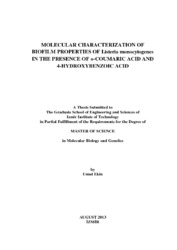Please use this identifier to cite or link to this item:
https://hdl.handle.net/11147/3620Full metadata record
| DC Field | Value | Language |
|---|---|---|
| dc.contributor.advisor | Soyer Dönmez, Ferda | en |
| dc.contributor.author | Ekin, Umut | - |
| dc.date.accessioned | 2014-07-22T13:51:57Z | - |
| dc.date.available | 2014-07-22T13:51:57Z | - |
| dc.date.issued | 2013 | en |
| dc.identifier.uri | http://hdl.handle.net/11147/3620 | - |
| dc.description | Thesis (Master)--Izmir Institute of Technology, Molecular Biology and Genetics, Izmir, 2013 | en |
| dc.description | Includes bibliographical references (leaves: 38-42) | en |
| dc.description | Text in English; Abstract: Turkish and English | en |
| dc.description | xii, 43 leaves | en |
| dc.description | Full text release delayed at author's request until 2016.08.21 | en |
| dc.description.abstract | Biofilms in medical and food industries are difficult to deal with. The formation of biofilms on every type of surfaces, ability to withstand in biofilm structures against thousand folds of lethal antibiotic doses and reasoning for different kinds of chronic diseases prove dangerousness of biofilms. Food borne pathogens that survive in biofilms can contaminate foods and feeding tubes which results food poisonings, outbreaks and infections. Listeria monocytogenes EGDe is one of the dangerous food borne pathogens with ability to form biofilms and cause listeriosis among elderly people, immunocompromised patients or pregnant women, which results lethal consequences. In this study, 4-hydroxybenzoic acid and o-coumaric acid that have potential antimicrobial and antibiofilm effect on Listeria monocytogenes EGDe were examined. Furthermore, protein profiles were investigated in the presence of phenolic acids. The antimicrobial assays of selected phenolic acids revealed the MICs against Listeria monocytogenes EGDe which are 18 mM for 4-hydroxybenzoic acid and 10 mM for ocoumaric acid. In the presence of MICs, while o-coumaric acid reduced initial attachment at 58%, 4-hydroxybenzoic acid reduced 48%. 4-hydroxybenzoic acid and ocoumaric acid also showed inhibitory effects on preformed biofilms as 34% and 56% respectively. The inhibitory effects of selected phenolic acids were ensured by visualization with SEM and Flourescence Microscopy. Afterwards, Listeria monocytogenes EGDe was treated with MIC of phenolic acids for total protein isolation. Isolated proteins were subjected to in-gel digestion and analysed in nanoLC-ESIMS/ MS system to interpret the mode of actions of antimicrobial and antibiofilming properties | en |
| dc.language.iso | en | en_US |
| dc.publisher | Izmir Institute of Technology | en |
| dc.rights | info:eu-repo/semantics/openAccess | en_US |
| dc.subject.lcsh | Biofilms | en |
| dc.title | Molecular characterization of biofilm properties of listeria monocytogenes in the presence of o-coumaric acid and 4-hydroxybenzoic acid | en_US |
| dc.type | Master Thesis | en_US |
| dc.institutionauthor | Ekin, Umut | - |
| dc.department | Thesis (Master)--İzmir Institute of Technology, Molecular Biology and Genetics | en_US |
| dc.relation.publicationcategory | Tez | en_US |
| item.languageiso639-1 | en | - |
| item.fulltext | With Fulltext | - |
| item.openairecristype | http://purl.org/coar/resource_type/c_18cf | - |
| item.openairetype | Master Thesis | - |
| item.grantfulltext | open | - |
| item.cerifentitytype | Publications | - |
| Appears in Collections: | Master Degree / Yüksek Lisans Tezleri | |
Files in This Item:
| File | Description | Size | Format | |
|---|---|---|---|---|
| 10013223.pdf | MasterThesis | 3.11 MB | Adobe PDF |  View/Open |
CORE Recommender
Page view(s)
162
checked on Jul 22, 2024
Download(s)
86
checked on Jul 22, 2024
Google ScholarTM
Check
Items in GCRIS Repository are protected by copyright, with all rights reserved, unless otherwise indicated.